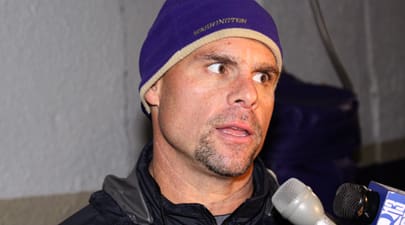For heavens sakes, Holt, gamble a little

If the Washington Huskies want to improve their regular season win total for the third year in a row, the defensive play calling will simply have to be better.
Last week against Oregon State, the Huskies, time and time again, had opportunities to get the Beavers off the field.
Advertisement
"Our inability to make plays at critical moments, I thought, were key factors in the game," head coach Steve Sarkisian said.
One key play certainly stands out.
The Huskies (6-5, 3-4) trailed Oregon State 31-21 with just seven minutes to go, but had the Beavers on their own 1-yard line. A safety would make it a one-possession game and given the Huskies the ball.
The Beavers threw an incomplete pass on first down and it was obvious they were intent on getting out of danger via the pass, not the run. That turned out true as quarterback Sean Mannion again dropped back to pass on second down.
Mannion stood in his end zone for what seemed like an eternity as no Husky got as much as a sniff on him. Eventually, wide receiver Markus Wheaton broke free behind the defense and Mannion connected with him for a devastating 52-yard gain.
That play seemingly represented the whole game for the Washington Huskies: their inability to get any pressure on Mannion meant an inability to get off the field.
"The most common theme was we just couldn't get to the quarterback to at least make him move in the pocket before he had to make those throws," Sarkisian said.
The blame for that should not be put on the players. It should be on the coaches.
Defensive coordinator Nick Holt rarely brought any type of blitz and seemed content with dropping a bunch of guys back in coverage.
Eventually the coaches will have to realize that just doesn't work. The Huskies defensive backs just aren't good enough to stay in coverage for five or six seconds.
Still though, Sarkisian seemed unwilling to admit changes were needed.
"You don't rush as many guys and employ more guys into coverage and understand, 'Hey the pressure might not be there but you can cover better with more guys deployed,'" Sarkisian said.
"Then mixing it with some pressure and different things and making sure when we are pressuring, the right guys are going and that we're attacking protections and what they like to do."
Those are good ideas in theory, but at some point you need to realize that you just have to blitz and get the opposing quarterback out of rhythm, even if it means giving up a possible first down. If the Huskies are able to get the quarterback out of rhythm, they could eventually minimize the big plays, which have also hurt them.
"When you go back and look at the film, it's a gain of two, a gain of one, a gain of three, a gain of four," Sarkisian said. "Then it's a gain of 50, or a gain of 40."
"Consistently, I think we're getting better, but our ability to limit the big plays still hasn't gotten to the point where we need to be to ultimately be a really good defense."
Against Washington State Saturday in the Apple Cup that might just be the biggest concern, especially considering the Cougars have one of the top wide receivers in the conference in Marquess Wilson.
Wilson has 75 catches on the season for 1,280 yards and 10 touchdowns for 17.1 yards per catch.
"We've been susceptible to the big play this year so that's the first problem (Wilson) poses. He can create big plays whether it's the deep ball he's so good at catching or converting the short pass into a big play."
The Huskies have good players on defense. There are future NFL draft picks on that side of the ball.
But if they want to have any chance of slowing down Marquess Wilson and the Cougars on Saturday and winning the Apple Cup, the coaches will have to put those players in better positions to succeed.